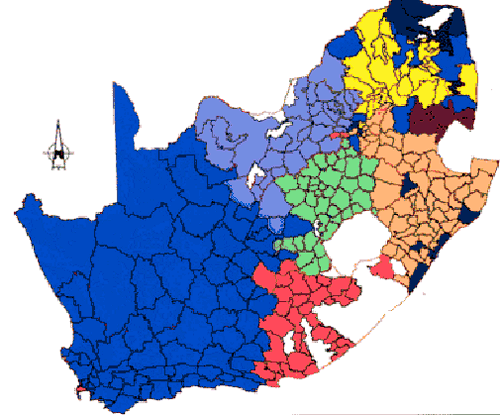A Backgrounder to Afrikaans
Afrikaans is a relatively young language, yet it is very old. With its roots in Medieval Dutch, Afrikaans and modern Dutch are roughly equidistant from Old Franconian and similar medieval Rhine valley dialects. Afrikaans vocabulary remained closer to the medieval languages, but Afrikaans simplified the grammar immensely. German has three gender distinctions (DIE, DER, DAS), Dutch has two (HET, DE) and Afrikaans, like English, eliminated the gender distinction of nouns and uses (DIE). Afrikaans does not conjugate verbs.
Below is a map of where in South Africa Afrikaans is the dominant langauge.
So, what does it mean?
It means that in German and Dutch you have to cope with many more variables to construct the same meaning. Afrikaans uses essentially the same vocabulary, but reduces grammar variables. Afrikaans and Dutch share between 95% - 99% the same vocabulary. There are some consistent spelling differences between the languages. As an Afrikaans speaker, I can immediately understand Dutch, yet I have found, the Dutch need a few weeks to be up to speed with Afrikaans.
Thus, if you are a scholar of European languages, Afrikaans would be a superb entrance to the Germanic world.
But that is certainly not all. Afrikaans is obviously also an African language. If you have an interest in things African, this is an exciting venture into an exotic part of the world. Much historical and anthropological research is available in Afrikaans. It is an academic langauge, and should provide you with superb resources.
But, then there is the social aspect, the braaivleis (BBQ) African style, the humor, and access to the rich diversity of the peoples that speak the language.
A Backgrounder to Venda
Venda is an official language in South Africa with over a million speakers. Other than their homeland in the north east of South Africa, many Vendas have migrated to the bigger cities in the Gauteng province for better employment opportunities.
Venda is a written language and other than being taught as a subject in school it is the mother tongue of instruction for the first three years of primary school. Then English takes over. A subset of the Venda culture is the Lemba people, a Semitic tribe. Radio Phalaphala is the Venda radio station. There are no newspapers in the language and it's presence on TV is small.
Venda is an agglutinating language where prefixes and suffixes alter the word meaning and sentence structure. It is also a tonal language. Regional venda dialcts include: Tshimanda, Tshimbedzi, Tshilembethu, Tshironga (Southern Venda) and Tshiguvhu (South-Eastern Venda), Tshipani, and Tshiilafuri.
Below is a map of linguistic dominance of the diverse languages in South Africa. Venda is the top north eastern language

| Afrikaans | = Medium Blue | Xhosa | = Red | Sesotho | = Light Green | |||
| Zulu | = Orange | English | = Black | Seswati | = Brown | |||
| SeTwana | = Light Purple | Northern Sotho | = Yellow | TsiVenda | = Dark Blue |
| A a | B b | (C c) | D d | Ḓ ḓ | E e | F f | |
| G g | H h | I i | (J j) | K k | L l | Ḽ ḽ | |
| M m | N n | Ṋ ṋ | Ṅ ṅ | O o | P p | (Q q) | |
| R r | S s | T t | á¹° á¹± | U u | V v | W w | |
| X x | Y y | Z z |
It means that in German and Dutch you have to cope with many more variables to construct the same meaning. Afrikaans uses essentially the same vocabulary, but reduces grammar variables. Afrikaans and Dutch share between 95% - 99% the same vocabulary. There are some consistent spelling differences between the languages. As an Afrikaans speaker, I can immediately understand Dutch, yet I have found, the Dutch need a few weeks to be up to speed with Afrikaans.
Thus, if you are a scholar of European languages, Afrikaans would be a superb entrance to the Germanic world.
But that is certainly not all. Afrikaans is obviously also an African language. If you have an interest in things African, this is an exciting venture into an exotic part of the world. Much historical and anthropological research is available in Afrikaans. It is an academic language, and should provide you with superb resources. But, then there is the social aspect, the braaivleis (BBQ) African style, the humor, and access to the rich diversity of the peoples that speak the language.
Other resources about the language: Please see Language Links
(please report any dead links or suggest new ones -- click on the comments-feedback link below)
